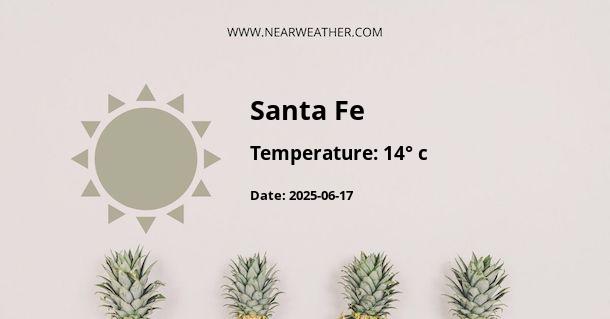Santa Fe de la Vera Cruz, Argentina: Climate and Weather Overview
Santa Fe de la Vera Cruz, commonly known as Santa Fe, is the capital city of the province of Santa Fe in Argentina. It is located in the central part of the country, and it is known for its rich history, cultural heritage, and pleasant climate. Understanding the climate and weather patterns of Santa Fe is essential for residents, tourists, and businesses operating in the region. This comprehensive guide provides detailed information about Santa Fe's climate, including temperature variations, precipitation levels, and seasonal weather patterns throughout the year.
Climate Classification
Santa Fe has a humid subtropical climate, characterized by distinct seasons with hot summers and mild winters. The city experiences a moderate amount of rainfall throughout the year, and its climate is influenced by its proximity to the Paraná River and the surrounding landscape.
Temperature
The temperature in Santa Fe varies significantly throughout the year. Summers, which span from December to February, are typically hot and humid, with average high temperatures reaching 30-32°C (86-90°F). On the other hand, winters, from June to August, are relatively mild, with average high temperatures ranging from 15-17°C (59-63°F). The lowest temperatures occur in the early morning or late evening, often dropping to 3-5°C (37-41°F), especially in the coldest months of June and July.
Precipitation
Santa Fe experiences relatively consistent levels of precipitation throughout the year, with a marked increase during the summer months. The annual average precipitation is around 1,000-1,200 mm. During the summer, heavy rain and thunderstorms are common, contributing to the city's lush greenery and vibrant ecosystem. The winter months, in contrast, are drier, with significantly reduced precipitation levels.
Seasonal Weather Patterns
Understanding the seasonal weather patterns in Santa Fe is crucial for planning activities and making travel arrangements. The following chart provides an overview of the average monthly temperature and precipitation patterns in Santa Fe throughout the year:
| Month | Average Temperature (°C) | Precipitation (mm) |
|---|---|---|
| January | 30 | 110 |
| February | 32 | 120 |
| March | 28 | 110 |
| April | 25 | 90 |
| May | 21 | 70 |
| June | 17 | 50 |
| July | 16 | 40 |
| August | 17 | 50 |
| September | 20 | 70 |
| October | 24 | 90 |
| November | 28 | 100 |
| December | 30 | 110 |
As depicted in the chart, Santa Fe experiences its highest temperatures and precipitation levels during the summer months, particularly in January and February. In contrast, the winter months of June and July are cooler and drier, making them favorable for outdoor activities and sightseeing.
Conclusion
In conclusion, Santa Fe de la Vera Cruz, Argentina, offers a diverse and dynamic climate characterized by hot summers, mild winters, and consistent precipitation levels throughout the year. Understanding the city's climate and seasonal weather patterns is essential for residents and visitors alike, enabling them to make informed decisions regarding outdoor activities, travel plans, and overall environmental adaptation. With its unique blend of subtropical climate and picturesque landscapes, Santa Fe continues to attract individuals seeking a well-rounded experience in the heart of Argentina.
A - Santa Fe's Latitude is -31.633329 & Longitude is -60.700001.
A - Weather in Santa Fe is 1° today.
A - Climate Conditions in Santa Fe shows overcast clouds today.
A - Humidity in Santa Fe is 57% today.
A - Wind speed in Santa Fe is 8.68 km/h, flowing at 32° wind direction. today.
